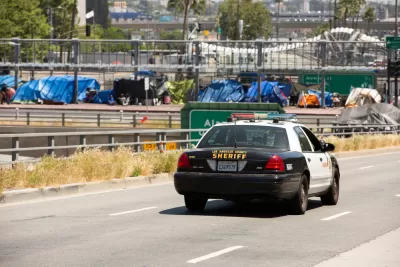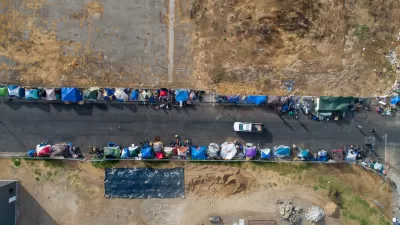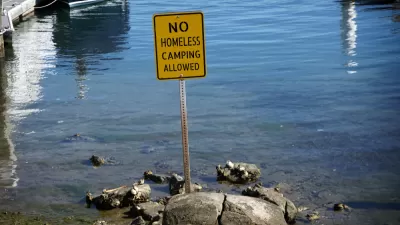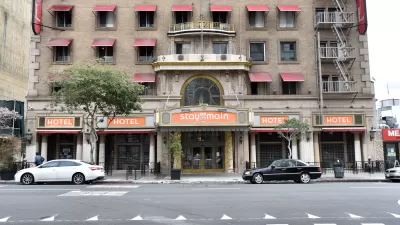A list dubbed the ‘Dirty Dozen’ shames the cities where unhoused people face the most harassment and least support from authorities.

A list compiled by the National Coalition for the Homeless identifies the ‘meanest cities’ in the United States when it comes to how officials treat unhoused people and the resources available to them. The Dirty Dozen list seeks to highlight the harassment and violence that people experiencing homelessness often face at the hands of law enforcement and others.
Each one of the Dirty Dozen cities are regularly harassing those who stay outside and have been engaging in sweeps for over a year. Each one of these cities has a severe lack of affordable housing, including long waiting lists for subsidized housing, while rents and evictions are both on the rise. Every one of these cities has an inability to house everyone requesting assistance, even in emergency congregate facilities.
According to the white paper, “The Dirty Dozen Meanest Cities in the United States is meant to highlight that neglect and hostility towards those without housing is leading to more people dying while homeless in one of the richest countries on the planet.”
With some of the country’s most expensive and scarce housing stock, the country’s largest population of unhoused people, regular law enforcement sweeps of areas like Venice Beach, and a much-publicized closure of Echo Park, Los Angeles tops the list of meanest cities. Three other California cities make the list, as well as New York City, Atlanta, and the nation’s capital.
The paper also notes that some—if only a few—cities “have not engaged in sweeps during the pandemic, but rather have worked hard to house those living outside,” including Pittsburgh, Santa Fe, and Cleveland.
See the source article for the full list, two dishonorable mentions, and how the NCH made its selections.
FULL STORY: DIRTY DOZEN MEANEST CITIES IN THE US

Alabama: Trump Terminates Settlements for Black Communities Harmed By Raw Sewage
Trump deemed the landmark civil rights agreement “illegal DEI and environmental justice policy.”

Study: Maui’s Plan to Convert Vacation Rentals to Long-Term Housing Could Cause Nearly $1 Billion Economic Loss
The plan would reduce visitor accommodation by 25% resulting in 1,900 jobs lost.

Why Should We Subsidize Public Transportation?
Many public transit agencies face financial stress due to rising costs, declining fare revenue, and declining subsidies. Transit advocates must provide a strong business case for increasing public transit funding.

Wind Energy on the Rise Despite Federal Policy Reversal
The Trump administration is revoking federal support for renewable energy, but demand for new projects continues unabated.

Passengers Flock to Caltrain After Electrification
The new electric trains are running faster and more reliably, leading to strong ridership growth on the Bay Area rail system.

Texas Churches Rally Behind ‘Yes in God’s Back Yard’ Legislation
Religious leaders want the state to reduce zoning regulations to streamline leasing church-owned land to housing developers.
Urban Design for Planners 1: Software Tools
This six-course series explores essential urban design concepts using open source software and equips planners with the tools they need to participate fully in the urban design process.
Planning for Universal Design
Learn the tools for implementing Universal Design in planning regulations.
Caltrans
Smith Gee Studio
Institute for Housing and Urban Development Studies (IHS)
City of Grandview
Harvard GSD Executive Education
Toledo-Lucas County Plan Commissions
Salt Lake City
NYU Wagner Graduate School of Public Service





























